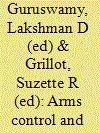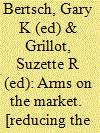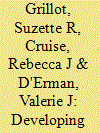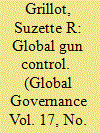|
|
|
Sort Order |
|
|
|
Items / Page
|
|
|
|
|
|
|
| Srl | Item |
| 1 |
ID:
059106


|
|
|
|
|
| Publication |
New York, Transnational Publishers, 2001.
|
| Description |
viii, 274p.
|
| Standard Number |
1571051465
|
|
|
|
|
|
|
|
|
|
|
|
Copies: C:1/I:0,R:0,Q:0
Circulation
| Accession# | Call# | Current Location | Status | Policy | Location |
| 045132 | 363.7/GUR 045132 | Main | On Shelf | General | |
|
|
|
|
| 2 |
ID:
001693


|
|
|
|
|
| Publication |
New York, Routledge, 1998.
|
| Description |
xiv, 239p.
|
| Standard Number |
0415920582
|
|
|
|
|
|
|
|
|
|
|
|
Copies: C:1/I:0,R:0,Q:0
Circulation
| Accession# | Call# | Current Location | Status | Policy | Location |
| 041185 | 367.1974/BER 041185 | Main | On Shelf | General | |
|
|
|
|
| 3 |
ID:
072627


|
|
|
|
|
| Publication |
2006.
|
| Summary/Abstract |
For nearly ten years, nongovernmental actors have raised concerns about the increased accessibility of small arms and light weapons around the world. By the late 1990s, hundreds of these nongovernmental actors began to coalesce together in an effort to enhance awareness, conduct research and affect policy relevant to small arms issues. How did this NGO coalition emerge? How does it operate? How effective has it been? Where is it headed? To answer these questions we seek to assess the structure and activities of the SAM based on existing understandings of transnational social movements. We focus specifically on the emergence, structure and effectiveness of the SAM-a movement that has, according to many of its participants, founders and observers, struggled over its years of operation to achieve its objectives. Moreover, we offer a comparative analysis of the successful International Campaign to Ban Landmines in an effort to demonstrate similarities and differences in the two transnational organizations. Our findings lead to a number of recommendations we believe the SAM should heed to become more effective.
|
|
|
|
|
|
|
|
|
|
|
|
|
|
|
|
| 4 |
ID:
098464


|
|
|
|
|
| Publication |
2010.
|
| Summary/Abstract |
This article examines how external third parties, particularly international organizations, can facilitate the development of security community and international integration within post-conflict societies. Focusing on seven countries in the Western Balkan region, this study offers unique insight into how and why feelings of trust and a sense of community can be encouraged by external actors - the EU and NATO in this case - and how and if trust and community can filter down to the most local levels within post-conflict societies. Ultimately, we argue that both the EU and NATO have, primarily through membership requirements to engage in regional interaction and cooperation, significantly contributed to the development of security community among Western Balkan neighbors at the elite level. However, we also find that feelings of trust and belongingness are still very much lacking among the general population of the Western Balkan region. Such insights will further efforts to enhance conflict resolution and post-conflict reconstruction in the Western Balkans and elsewhere.
|
|
|
|
|
|
|
|
|
|
|
|
|
|
|
|
| 5 |
ID:
108964


|
|
|
|
|
| Publication |
2011.
|
| Summary/Abstract |
The global spread and misuse of small arms is one of the most alarming and growing security issues of the post-Cold War era. For many reasons, however, controlling the spread of small arms is extremely difficult. Nonetheless, given the serious nature of the small arms issue, numerous states, nongovernmental organizations, and individual activists have sought to address various small arms problems. One of the earliest suggestions that analysts and advocates offered was to develop international norms and standards of behavior that outline the parameters of acceptable small arms activities. Despite the numerous actions that states and NGOs have taken over the past ten years in an effort to combat these problems, corresponding norms are relatively weak or nonexistent. This article seeks to answer why this is the case. It examines why global small arms control norms are largely weak or nonexistent and explains why the prospects for stronger norms are few. Although research on norms in international relations is swelling with studies showing whether, how, and why norms emerge and affect state behavior, few studies focus on cases where norms actually do not emerge or influence action. The primary explanation for weak small arms norms is a competitive normative environment that is facilitated and perpetuated by: (1) competing coalitions that promote opposing norms and ideas and (2) a great-power consensus that works against stronger arms control norms.
|
|
|
|
|
|
|
|
|
|
|
|
|
|
|
|
|
|
|
|
|